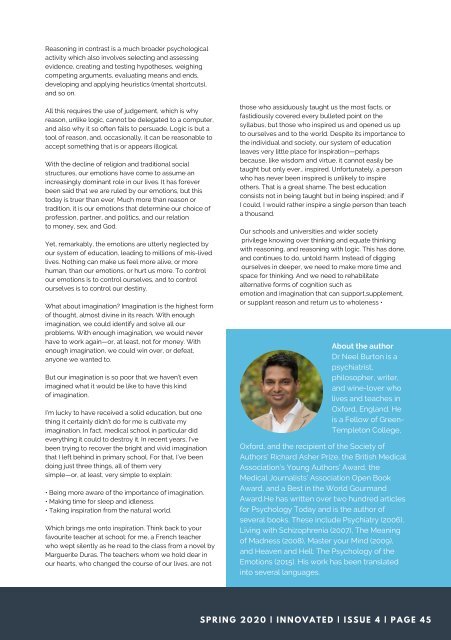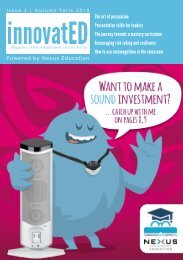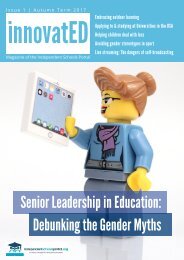innovatED Magazine - Issue 4 - Spring 2020
A mixture of news, opinion, research, ideas, great practice and regulatory updates. innovatED takes a global perspective and brings the latest educational developments from across the world onto your laptop, smartphone - and with the printed edition - into your staff room.
A mixture of news, opinion, research, ideas, great practice and regulatory updates. innovatED takes a global perspective and brings the latest educational developments from across the world onto your laptop, smartphone - and with the printed edition - into your staff room.
You also want an ePaper? Increase the reach of your titles
YUMPU automatically turns print PDFs into web optimized ePapers that Google loves.
Reasoning in contrast is a much broader psychological<br />
activity which also involves selecting and assessing<br />
evidence, creating and testing hypotheses, weighing<br />
competing arguments, evaluating means and ends,<br />
developing and applying heuristics (mental shortcuts),<br />
and so on.<br />
All this requires the use of judgement, which is why<br />
reason, unlike logic, cannot be delegated to a computer,<br />
and also why it so often fails to persuade. Logic is but a<br />
tool of reason, and, occasionally, it can be reasonable to<br />
accept something that is or appears illogical.<br />
With the decline of religion and traditional social<br />
structures, our emotions have come to assume an<br />
increasingly dominant role in our lives. It has forever<br />
been said that we are ruled by our emotions, but this<br />
today is truer than ever. Much more than reason or<br />
tradition, it is our emotions that determine our choice of<br />
profession, partner, and politics, and our relation<br />
to money, sex, and God.<br />
Yet, remarkably, the emotions are utterly neglected by<br />
our system of education, leading to millions of mis-lived<br />
lives. Nothing can make us feel more alive, or more<br />
human, than our emotions, or hurt us more. To control<br />
our emotions is to control ourselves, and to control<br />
ourselves is to control our destiny.<br />
What about imagination? Imagination is the highest form<br />
of thought, almost divine in its reach. With enough<br />
imagination, we could identify and solve all our<br />
problems. With enough imagination, we would never<br />
have to work again—or, at least, not for money. With<br />
enough imagination, we could win over, or defeat,<br />
anyone we wanted to.<br />
But our imagination is so poor that we haven’t even<br />
imagined what it would be like to have this kind<br />
of imagination.<br />
I’m lucky to have received a solid education, but one<br />
thing it certainly didn’t do for me is cultivate my<br />
imagination. In fact, medical school in particular did<br />
everything it could to destroy it. In recent years, I’ve<br />
been trying to recover the bright and vivid imagination<br />
that I left behind in primary school. For that, I’ve been<br />
doing just three things, all of them very<br />
simple—or, at least, very simple to explain:<br />
• Being more aware of the importance of imagination.<br />
• Making time for sleep and idleness.<br />
• Taking inspiration from the natural world.<br />
Which brings me onto inspiration. Think back to your<br />
favourite teacher at school: for me, a French teacher<br />
who wept silently as he read to the class from a novel by<br />
Marguerite Duras. The teachers whom we hold dear in<br />
our hearts, who changed the course of our lives, are not<br />
those who assiduously taught us the most facts, or<br />
fastidiously covered every bulleted point on the<br />
syllabus, but those who inspired us and opened us up<br />
to ourselves and to the world. Despite its importance to<br />
the individual and society, our system of education<br />
leaves very little place for inspiration—perhaps<br />
because, like wisdom and virtue, it cannot easily be<br />
taught but only ever… inspired. Unfortunately, a person<br />
who has never been inspired is unlikely to inspire<br />
others. That is a great shame. The best education<br />
consists not in being taught but in being inspired; and if<br />
I could, I would rather inspire a single person than teach<br />
a thousand.<br />
Our schools and universities and wider society<br />
privilege knowing over thinking and equate thinking<br />
with reasoning, and reasoning with logic. This has done,<br />
and continues to do, untold harm. Instead of digging<br />
ourselves in deeper, we need to make more time and<br />
space for thinking. And we need to rehabilitate<br />
alternative forms of cognition such as<br />
emotion and imagination that can support,supplement,<br />
or supplant reason and return us to wholeness •<br />
About the author<br />
Dr Neel Burton is a<br />
psychiatrist,<br />
philosopher, writer,<br />
and wine-lover who<br />
lives and teaches in<br />
Oxford, England. He<br />
is a Fellow of Green-<br />
Templeton College,<br />
Oxford, and the recipient of the Society of<br />
Authors' Richard Asher Prize, the British Medical<br />
Association's Young Authors' Award, the<br />
Medical Journalists' Association Open Book<br />
Award, and a Best in the World Gourmand<br />
Award.He has written over two hundred articles<br />
for Psychology Today and is the author of<br />
several books. These include Psychiatry (2006),<br />
Living with Schizophrenia (2007), The Meaning<br />
of Madness (2008), Master your Mind (2009),<br />
and Heaven and Hell: The Psychology of the<br />
Emotions (2015). His work has been translated<br />
into several languages.<br />
S P R I N G 2 0 2 0 | I N N O V A T E D | I S S U E 4 | P A G E 4 5






